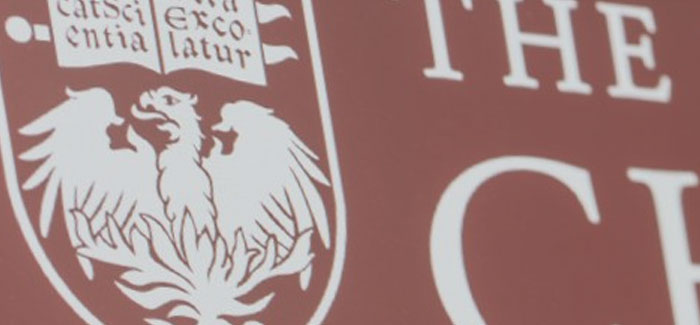
A second home for China scholars
Scenes from a big week at the Center in Beijing.
Late one Tuesday afternoon in September, a fleet of motor coaches traveled the short distance from a downtown Beijing hotel to the seat of the Chinese government, the Great Hall of the People. Riding the buses were Chicago faculty, deans, students, alumni, officials, and friends; the September 14–15 events in celebration of the University of Chicago Center in Beijing's opening were about to begin.
Those events drew nearly 600 guests and—like much ongoing activity based at the center—involved many faculty and students from the Social Sciences Division. Leading the center's academic work is its faculty director, political scientist Dali Yang. He and anthropologist Judith Farquhar, AM'75, AM'79, PhD'86, lead its programs for undergraduates. And the first event of the opening, held in an amphitheater on an upper floor of the massive Hall, put Nobel Prize–winning economists Gary Becker, AM'53, PhD'55, James Heckman, and Roger Myerson in the spotlight.
President Robert J. Zimmer and physics Nobelist James Cronin, SM'53, PhD'55, joined Becker, Heckman, and Myerson onstage for "The Spirit of the University of Chicago and the Power of Ideas," a panel discussion that kicked off the two-day celebration. (C. N. Yang, PhD'48, a chemistry Nobelist, was scheduled to appear as well but was unable to participate.) To begin, President Zimmer asked each laureate to discuss one major challenge now faced by his discipline.
Becker spoke about the challenge to elucidate what drives rapid economic development, using China during the last 30 years as a test case. "Economists don't have successful general theories of economic development," he said, noting that China's present challenge is to become a richer nation in terms of per capita income by means of developing its human capital. Heckman invoked the quest to "make economics into a full-fledged, empirical science that relies on hard evidence" and informs public policy. And Myerson, using the history of English monarchs as his case study, addressed the role of moral hazard in understanding basic institutions—how those institutions create incentives for the powerful to use their power for the good.
The next morning, Zimmer was joined by the presidents of Beijing's Tsinghua, Renmin, and Peking universities for a panel discussion of higher education in their countries. Three more faculty discussions followed, addressing the three areas where the center's research is focused: business, economics, and policy; culture, society, and the arts; and science, medicine, and public health. Late that afternoon, activity shifted to the center itself, which takes up the 20th floor of an office building in Beijing's university district.
With onlookers crowding the room, the honorary chairman of Taiwan's Kuomintang Party, Lien Chan, AM'61, PhD'65 (political science), delivered remarks—"I'm full of joy," he said, and "particularly delighted that many organizations in China can deepen their relations with Chicago through the center." (By design, and unlike the facilities of most peer universities, Chicago's center is not affiliated with any single Chinese institution.) Following Zimmer's remarks and a round of thanks to those who made the facility possible, he, Lien, Yang, Farquhar, and five other representatives of the University and of China cut the red ribbon to open the center officially.
The next day, the center stayed abuzz with a conference on medical collaborations between Chicago and Chinese scientists. The economics faculty who had participated in the opening kept busy, too, taking part in a conference at nearby Renmin University on family and labor economics, cosponsored by the center. It wasn't until Friday morning that activity scaled down—but didn't cease.
Farqhuar was at work in her office on a new study of traditional Chinese medicine she launched last March with Lili Lai, a postdoc at Peking University. Lai was there, too, preparing grant proposals for the project. As lunchtime approached, Farqhuar's dissertation student Saul Thomas, AB'95, AM'02, the TA for Civilization Abroad this autumn, wandered over from the visiting scholars area, where he'd been preparing for the 19 undergraduates who would soon arrive in China. An elevator chimed down the hall and Lily Chumley, another of Farquhar's graduate advisees, showed up with her new baby girl in a sling over her shoulder. On the center's first relatively quiet day of the week, the four animated one corner of the center in conversation about their work. Except for the Beijing views in the background, it could have been a scene in Haskell Hall.
